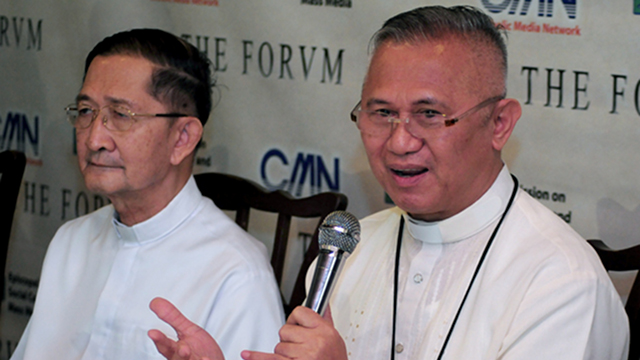SUMMARY
This is AI generated summarization, which may have errors. For context, always refer to the full article.

MANILA, Philippines – More than two years since pulling out from the negotiating table over the Reproductive Health (RH) issue, Catholic Church officials have agreed to cease hostilities with Malacañang — for now.
But it remains a shaky truce.
Over dinner that consisted of salad, soup, paella, and fish on Tuesday, March 5, President Benigno Aquino III broke bread with high-ranking officials of the Catholic Bishops’ Conference of the Philippines (CBCP) —their first meeting since the scuttled dialogue over the RH controversy in 2011.
During the dinner, Malacañang and the CBCP agreed to “set up a structure or mechanism” that will allow a continuous dialogue between both sides and avoid what happened in the past, according to Budget Secretary Florencio Abad and Agrarian Reform Secretary Virgilio de los Reyes said in separate phone interviews. The two were among the Cabinet officials present in the dinner.
They said the RH issue — a certain appetite spoiler — was not discussed. “The RH was not discussed. Both parties were conscious of the fact that they are just restarting the dialogue,” Abad told Rappler.
Abad said both sides agreed to put up a mechanism to facilitate dialogue and further collaboration on issues such as poverty and human rights.
De Los Reyes said the Office of the President will put up a liaison office that will facilitate continuing talks between both sides.
Among those present was Manila bishop Broderick Pabillo. Monsignor Joselito Asis, CBCP secretary-general, earlier told reporters that a meeting indeed took place with the President. Other CBCP officials refused to be interviewed.
Until Tuesday, the Aquino government — unlike previous administrations — had refrained from tapping any liaison official with religious groups. The President reportedly did not want to follow in the footsteps of his predecessors because he found their style of dealing with Church leaders questionable.
This however strained ties with the Catholic Church, as well as the bloc-voting Iglesia ni Cristo.
The dinner meeting came on the heels of the involvement of some bishops in a negative campaign senatorial candidates, most of whom are running under Team PNoy, who supported the passage of the RH law. (Read: What the campaign against Team Patay means)
Six dioceses so far have served notice that they will be campaigning against these candidates, in what could be a prelude to greater Church involvement not just in the 2013 race but in the 2016 presidential elections as well.
De Los Reyes said the dinner meeting with top-level CBCP officials was “open and cordial,” punctuated with “fresh exchange of views.” The agrarian reform secretary bore the brunt of the January pastoral letter of the CBCP over the supposed slow implementation of the Comprehensive Agrarian Reform Program Extension with Reforms (Carper).
At least 85 bishops have petitioned President Aquino to sack De Los Reyes.
Pastoral letter
Abad said the CBCP pastoral letter was the main agenda during the meeting, where the bishops touched on corruption, cases of human rights violation, the implementation of Carper, political dynasties, concerns over automated elections, economic growth that has not trickled down to the poor, among others.
“We used the pastoral letter as the starting point, to clarify what the government is doing and what the government plans to do,” he said.
Key Cabinet secretaries each made a presentation to the bishops “to put everything in perspective.” An open forum followed.
Asked how the bishops reacted to the presentations, Abad said: “Some were emphatic and passionate on certain concerns but they were not belligerent.”
De los Reyes responded to the bishops’ criticism on the slow implementation of Carper, which is expiring in 2014. Asked if the bishops were satisfied with his explanation, De Los Reyes said: “ I have not gained the gift to interpret the bishops’ minds.”
On the automated polls, the bishops were told that this is best addressed by the Commission on Elections, an autonomous constitutional body. The bishops raised concerns over the integrity of the counting machines and the transparency in the transmission and counting of votes.
The dinner meeting reportedly ended around 11 pm, with both parties agreeing to set aside their differences in the meantime. “It ended in a nice way. We did not expect it any other way,” De los Reyes said. – Rappler.com
Add a comment
How does this make you feel?
There are no comments yet. Add your comment to start the conversation.